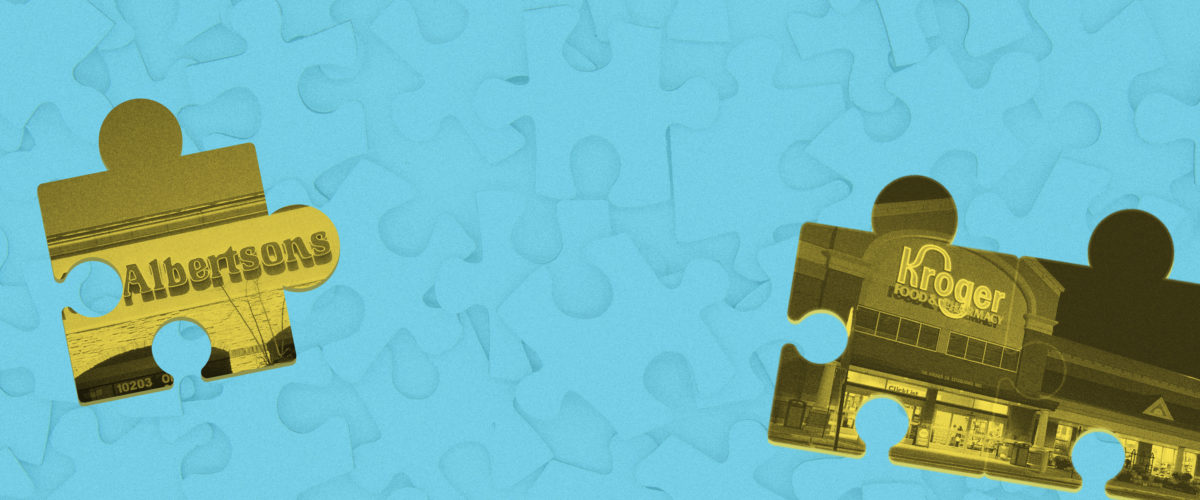This Grocery Merger Would Be Bad News for Prices and Families
Published November 4, 2022

In October, Grocery giants Kroger and Albertsons announced intentions to merge. If they do, CEOs will make billions while driving up food prices for working families.
by Mia DiFelice
We have enough to worry about these days, from conflict abroad and at home, to climate-fueled natural disasters. Going to the grocery store has become yet another daily anxiety for more of us than ever, as prices rise higher and higher.
But if a proposed merger between two grocery giants goes through, prices will rise even more.
In October, media outlets began reporting merger negotiations between Kroger and Albertsons, two of our country’s largest grocery store chains. The deal would net Kroger a cool $24.6 billion, with big payouts to the Albertsons CEO and its private equity owner. Meanwhile, the resulting Kroger behemoth could wield its new power to squeeze working families and entire communities.
Grocery Stores Gobble Market Power Through Mergers
Already, a handful of corporations dominate the grocery sector. Currently, over two-thirds of grocery sales in the U.S. go to four corporations, and a Kroger-Albertsons merger would make that three.
These corporations hide their outsized power in the market from consumers by buying up subsidiaries with different names. While you can shop at a Ralph’s, a Food 4 Less, or a Smith’s Food and Drug, the profits funnel into the same company—Kroger.
In recent years, mergers and acquisitions have become more outrageous. But judges and the federal agencies charged with protecting consumers seem not to care. In the past decade, they gave a pass to some of the largest mergers in history. Now, food giants tower over those of the trust-busting era that gave rise to our consumer protection agencies in the first place.
Grocery Monopolies Choose Profit Over People
The U.S. first began busting trusts, or monopolies, back in the early 1900s because it recognized how they harm the economy. Market power allows corporations to profit at the expense of smaller companies, consumers, and regional economies.
For instance, when grocery corporations grow, they often become the biggest or only buyer in a region. Grocery giants can name the price they pay for goods, ripping off farmers and manufacturers, who must accept whatever they can get to stay afloat.
On the other side of the grocery aisle, these giants can raise prices for shoppers with impunity. Last summer, Kroger’s CEO Rodney McMullen even bragged about hiding behind inflation to raise food prices and boost profits.
At the same time, superstores like Kroger and Walmart beat out smaller, local businesses by lowering prices on key items. These small stores, unable to compete, are forced to shutter.
However, the low prices don’t stick around. In fact, the Federal Trade Commission found that growing market concentration actually leads to higher prices. But by then, consumers have no other choice but to shop at the superstores.
The arrival of such a superstore can have other ripple effects throughout a region. It can lower wages by introducing its own rock-bottom pay schedules to the local labor market. And by shuttering competitors, it can reduce food access to just a single superstore. This especially impacts access for low-income city residents, who are less likely to own cars, as well as far-flung rural communities.
Not Just Groceries — Monopolies Threaten Our Whole Food System
The Kroger-Albertsons merger is only the latest in a long string of threats to consumers throughout our food system. For instance, during the pandemic, meat corporations boosted retail prices while paying farmers less. One meat corporation even lied to the public about meat supplies to keep workers in plants — and money coming in — during the worst of the pandemic.
While clerks and meatpackers risked death by COVID in their workplaces, many corporations limited hazard pay. Instead of keeping workers safe or compensating them fairly, they invested in stock buybacks to generate more cash for shareholders.
Meanwhile, food manufacturers have also consolidated. When it comes to the products we buy at the store, companies like Kraft-Heinz (the two merged in 2015), General Mills, and Campbell soup dominate multiple food categories like soft drinks, yogurt, and baby food.
And market power goes all the way to farm. A few corporations have taken over seeds, fertilizers, tractors, and more. At every step in our food system, from factory farm, to factory floor, to our kitchen tables, a handful of companies make the rules.
This not only affects the prices at the grocery store, but conditions for workers, the quality of our food, and the sustainability of our climate.
We Can Stop the Advance of Grocery Prices and Market Power
Even though the grocery giants always say mergers will help them lower prices for consumers, we know the one recently proposed will only hurt us.
Not only must the Federal Trade Commission reject the Kroger-Albertsons merger — we need to stop corporate greed and consolidation throughout our food system.
To this end, Democratic lawmakers chave proposed vital legislation, like the Food and Agribusiness Merger Moratorium Act and the Farm System Reform Act. They are working to reform our antitrust framework and re-envision our food system as one that works for everyone, not just corporations. To continue this work, they need to hold onto their majority in Congress.
In the run-up to the midterms, Food & Water Action is working tirelessly to mobilize voters and secure the strong turnout we need. This November, there’s a clear way to fight inflation and lower prices at the grocery store. Let’s elect leaders who will stand up to corporate giants and their relentless pursuit of profit.
Help us get out the vote! Reach out to three friends or family members and ask them to head to the polls.

